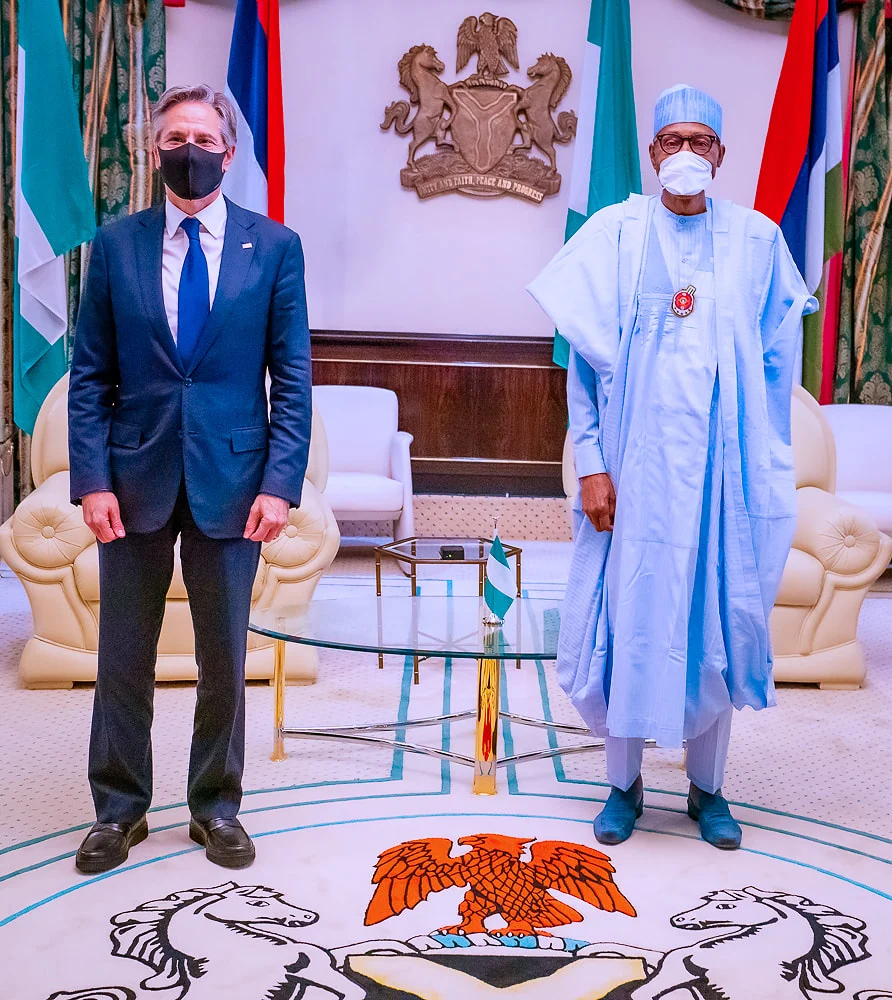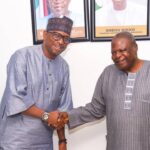US Secretary of State Anthony Blinken visited Nigeria last week on the second stop of his three-nation African tour to Kenya, Nigeria and Senegal. It was a follow-up to his virtual discussion with selected African states earlier this year which included Nigeria. A positive tone to the visit was set on the eve of his arrival in Nigeria when it was announced that the US had delisted Nigeria from a US list of countries that allegedly violate religious freedom.
This certainly was a welcome development as there was no justification whatsoever for that move by the US given that Nigeria has no record of persecution or restriction of any religion by government or any of its agencies. This development also helped engender the congenial atmosphere for the discussions that took place between Secretary Blinken and Nigerian leaders.
Blinken’s discussion with Nigerian officials ranged from the COVID-19 vaccines, insecurity, climate change, democracy and human rights. On the COVID-19 vaccines, while US assistance in donating about 5 million Pfizer vaccines to Africa has been acknowledged, as explained by Nigeria’s Foreign Affairs Minister Geoffrey Onyeama, what is most needed is for the US to help Africa in producing the vaccines locally. Africa is a continent of about one billion people, and clearly, it cannot depend on donations of vaccines produced elsewhere.
Secretary Blinken’s discussion with President Buhari, which centred on insecurity, was fitting enough considering the serious security challenges Nigeria is presently facing with the Boko Haram terrorists and their associates in the North East, banditry and kidnapping in the North West and attacks by members of the proscribed IPOB in the South East.
On this score, it is gratifying that the US has delivered the 12 Tucano ground attack planes ordered and paid for by Nigeria, which have been effectively deployed in the war against terrorists and insurgents in the country. Nigeria is still awaiting the Cobra helicopters, which it ordered from the US, that will greatly aid the forces in their quest to totally defeat the terrorists and related criminals in the country.
For all these, however, Nigerian officials must recognize that military power alone might not be sufficient to bring all of these various forms of security challenges in the country to an enduring end. Thus, in addition to military planes, the US should also support Nigeria in exploring other possibilities for ending these complex conflicts in the country.
The US and Nigeria also signed a 2.1 billion-dollar trade agreement during Blinken’s visit which will significantly widen the scope of US-Nigeria engagements in commerce and trade. It is hoped that this agreement will be concretized by diligent implementation from both sides. Nigeria is in desperate need of economic rejuvenation, but it is also important for Nigerian officials to ensure that any trade agreement with any country, the US included, favours the country more. Too often, trade agreements between Nigeria and other countries tend to offer little to Nigerians. We hope this will be different.
Blinken also discussed the growing de-democratization in African countries, what with the situation in Ethiopia, Sudan and other places. Nigeria and the US both called for a ceasefire in the fighting in Ethiopia and supported the ongoing mediation efforts initiated by the African Union led by Nigeria’s former president Olusegun Obasanjo.
It must be said, however, that while Secretary Blinken’s visit was, on the whole, positive and constructive, Nigeria and the US do not always agree on some issues. In its determination to promote the cause of democracy and human rights around the world, the US often overextends itself, delving into the internal affairs of other countries. Secretary Blinken ventured into that territory during his visit when he sought to comment on the leaked report of the judicial panel on the EndSARS protests last year which, it turns out, has now been discredited by the very government that set it up.
For him to have made pronouncements based on that report was not only inappropriate but also amounts to interference in Nigeria’s internal affairs which is unacceptable. As a global promoter of the rule of law, the US needs not to be told the importance of allowing due process to be observed on matters of this nature which involve all segments of the society and their rights under the Constitution of the Federal Republic of Nigeria. To seek to single out our law enforcement and security agencies who were performing their lawful duties during the EndSARS protests, and were themselves victims of the protests, for censure as Secretary Blinken did, was outrightly insensitive.
On the whole, while Nigeria and the US enjoy very good relations as Secretary Blinken’s visit clearly showed, going forward, we emphasise that sustaining it requires mutual respect for internal affairs. We wish both countries many friendly years ahead.

 Join Daily Trust WhatsApp Community For Quick Access To News and Happenings Around You.
Join Daily Trust WhatsApp Community For Quick Access To News and Happenings Around You.


